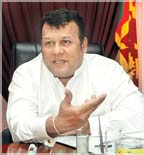|
UN Human Rights Council session:
Ill-timed - Human Rights Minister
The convening of a special session of the United Nations Human Rights
Council (HRC) to discuss ‘The human rights situation in Sri Lanka” is
ill-timed and unwarranted is the view of the Sri Lanka Government.
Disaster Management and Human Rights Minister Mahinda Samarasinghe
said the realities in Sri Lanka, where more than 250,000 civilians had
been liberated from the clutches of the most ruthless terrorist
organization in the world, and the aftermath of the largest known
hostage rescue operation in the world, gave no cause for any special
discussion of the human rights situation in the country.
|

Minister
Mahinda Samarasinghe |
“We feel this is a waste of time, energy and resources that could be
used more purposefully to assist in relief measures for the IDPs in the
country, by those who have genuine interest in their conditions, and the
situation regarding human rights in Sri Lanka,” he added.
He was referring to the special session of the HRC sought by 17 of
its 48 members, which is currently scheduled to be held on May 25 in
Geneva.
The special session is to be held under the rules of the HRC that
requires such a session to be held if one-third or 16 members of the
body call for such a session. Minister Mahinda Samarasinghe will lead
the Sri Lanka delegation at this special session.
The other members of the delegation will be the Attorney General
Mohan Peiris, Disaster Management and Human Rights Ministry Secretary
Dr. Rajiva Wijesinha and Sri Lanka’s Permanent Representative to then UN
in Geneva Dr. Dayan Jayatilleka.
The countries that called for the special session are Argentina,
Chile, Mexico, Uruguay, Republic of Korea, Slovakia, Slovenia, Ukraine,
Canada, France, Germany, Italy, Netherlands, Switzerland, United
Kingdom, Bosnia and Herzegovina and Mauritius.
The position of Sri Lanka is very clear that it does not believe in
the need for such a session of the HRC, which would seek to divert
attention from the more pressing need to provide relief to the large
number of Tamil citizens who have been liberated from the hold of the
LTTE, which the US State Department identified in 2008 as the most
ruthless terrorist organization in the world.
Sri Lanka expects the larger number of members of the HRC that did
not sign the call for this special session, as well as policy and
opinion in most other countries that do not have membership in the HRC,
would be supportive of Sri Lanka’s right as a sovereign country to
eliminate terrorism from its soil, and would also show appreciation of
the success that Sri Lanka has made in the larger global fight against
terrorism, and through this the safeguarding of human rights.
The members of the HRC that did not sign the call for the special
session are: Angola, Azerbaijan, Brazil, Burkina Faso, Bolivia, Cuba,
Cameroon, Djibouti, Egypt, Gabon, Ghana, Madagascar, Nigeria,
Senegal, South Africa, Zambia, Bahrain, Bangladesh, China, India,
Indonesia, Japan, Jordan, Malaysia, Pakistan, Qatar, Nicaragua, Saudi
Arabia, Philippines and the Russian Federation.
Political analysts said the signatories to the call for this special
session had a clear Euro-centric political alignment, which showed the
electoral pressures of the pro-LTTE Tamil populations in those
countries, and the pressures that such countries can bring on their
neighbours and on countries coming under the direct political and
economic influence.
They were of the view that this line up of countries, showed a clear
division of the Afro-Asian and Non-Aligned nations against the western
powers and countries under their influence, as well as the different
position taken by the new emerging economies of Asia and Latin America
against the traditional, and former colonial centres of power of the
West.
|



